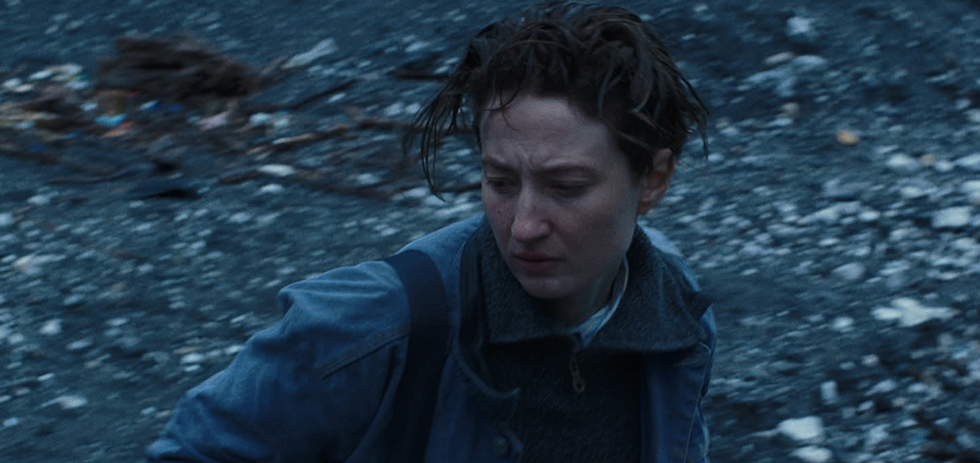
An odd, cluttered puzzle, which loses both narrative direction and cinematic form as it goes on, Laura Bispuri’s Sworn Virgin manages to tackle a curious cultural phenomenon with enough inconsistency to render its subject matter somehow more alien, and its characters somehow less relatable. Dealing with the arcane rural practice of its title in a manner which relies on pop-culture caricaturing both of the impoverished Albanian hills of the story’s beginning and of the urban Italian city of its end, the film’s stabs at commentary on gender identity and the status of the body in modern Europe come off as haphazard. Moreover, cliché-ridden camerawork and sound design fail to enliven the film, condemning it to forgettability.
The drastically underdeveloped nation of Albania has accordingly received little filmic exposure. With recent years’ surge in Balkan and Eastern European art cinema – see the Romanian New Wave and this year’s SFF feature Aferim!, and Nuri Bilge Ceylan’s Turkish slow-burners – audiences are certainly receptive to explorations of the often confronting and inaccessible worlds of post-Communist Eastern Europe. Probably Sworn Virgin’s first misstep, then, is uprooting half of the film to more cosmopolitan Italy. We spend flashback sequences in Albania, though, as orphan Hana (Alba Rohrwacher) is adopted by a traditional pastoral family, and thus grows up with Lila (Flonja Kodheli) as an ersatz sister. Rebelling as a teen against the strictures of the area’s centuries-old patriarchy leads her to an affinity with the notion of the ‘sworn virgin’, a woman who, pledging never to love, binds her chest, changes clothes, and ‘becomes’ a man in perpetuity. Now, twenty-odd years later, Hana, or now Mark, arrives in the Italian coastal city where Lila lives with her Albanian husband and very Italian teenaged daughter Jonida (Emily Ferratello).
Where a smarter film would have looked to explore Mark’s point of diversion from the culturally defined sworn virgin narrative – his leaving Albania – Bispuri instead maintains a separation between the gender standards by alternating between the two timelines, forcing viewers to ‘compare’ the two, consciously or not. As a result, there is a sense of a high school sociology class here, where any aspect of living as a sworn virgin in a developing nation has a neat analogue in postmodernity, ready for splitting into groups to discuss. The social role played by these figures is barely communicated, and so we have little idea of what Mark may be leaving behind. Indeed, the practice is introduced by Hana’s adoptive father as an almost respectable position, suggesting that the space occupied by these people represents a kind of third-gender ‘way out’ for those comfortable in neither a male nor female skin. Then, though, we are met with a barrage of heavy-handed lines outlining the community’s aggressively conservative ideals: Hana and Lila are repeatedly (and it really is repeated, in most of the Albanian scenes) reminded that girls don’t shoot rifles, need to be married off, and are effectively servant currency. The film seems wholly ambivalent, then, on whether a sworn virgin is a symptom of, or a resistor to, oppressive patriarchalism.
This feeling of non-committal effectively blunts the entire Italian narrative before it has begun, and leads to some troubling implications. As Hana/Mark reacquaints with her estranged sister while also assimilating into a more modern European environment, the issues of gender identity, having never been fully established back in Albania, fail to work to flesh out Mark’s exposure to new and threatening ideas. Jonida, a competitive synchronised swimmer, acts as both the voice of outspoken prejudice against her ‘uncle’s’ otherness, and as the narrative logic behind exposing him to the diverse and inclusive nature of the European body via the family’s visits to public pools.1 When their relationship turns for the better, though, there’s an uncomfortable implication that Mark is becoming able to clarify his gendered position by experiencing the pluralism of a more ‘modern’ culture. A clumsily developed and sordid romance with a pool attendant, and the predictable inclusion of Mark discovering things like make-up and lingerie, do not communicate the malaise of culture clash – as was probably intended – but instead give the impression that exposure to the cornucopia of permissibility available in a country like Italy has made ancient cultural tradition, whatever its worth, redundant.
Any viewer with even a passing familiarity with 21st Century European drama will feel a wave of déjà vu at some points. The predictability with which any scene featuring some source of diegetic sound will be immediately followed by an off-beat cut to a silent medium-shot is almost comical by the third or fourth time it happens. A favourite technique of sub-par screenwriters with Important Issues to present, the suggestion that characters’ inner turmoil means they forget how conversations work, and so fail to respond to questions and instead stare at their feet in close-up, is also egregiously present here. The Albanian scenes, while employing a landscape as enticingly rugged as its people, fail to capture the monochrome-style colouring of the striking snow and rocks that seem an ever-present backdrop. Stylistic panache, though, would have been consolation for Sworn Virgin, which would always live and die on its handling of its central premise. The film disappoints completely on this front, substituting an unearned intensity for meaningful examination of its own ideas.
Around the Staff
